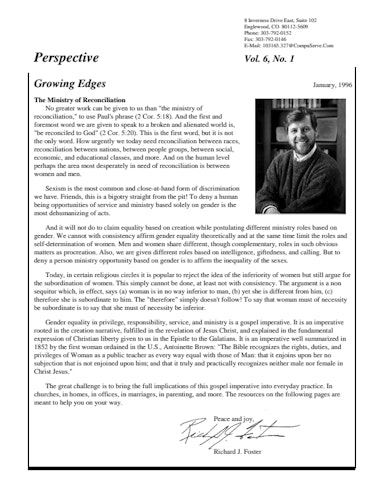The Ministry of Reconciliation
No greater work can be given to us than “the ministry of reconciliation,” to use Paul’s phrase (2 Cor. 5:18). And the first and foremost word we are given to speak to a broken and alienated world is, “be reconciled to God” (2 Cor. 5:20). This is the first word, but it is not the only word. How urgently we today need reconciliation between races, reconciliation between nations, between people groups, between social, economic, and educational classes, and more. And on the human level perhaps the area most desperately in need of reconciliation is between women and men.
Sexism is the most common and close-at-hand form of discrimination we have. Friends, this is a bigotry straight from the pit! To deny a human being opportunities of service and ministry based solely on gender is the most dehumanizing of acts.
And it will not do to claim equality based on creation while postulating different ministry roles based on gender. We cannot with consistency affirm gender equality theoretically and at the same time limit the roles and self-determination of women. Men and women share different, though complementary, roles in such obvious matters as procreation. Also, we are given different roles based on intelligence, giftedness, and calling. But to deny a person ministry opportunity based on gender is to affirm the inequality of the sexes.
Today, in certain religious circles it is popular to reject the idea of the inferiority of women but still argue for the subordination of women. This simply cannot be done, at least not with consistency. The argument is a non sequitur which, in effect, says (a) woman is in no way inferior to man, (b) yet she is different from him, © therefore she is subordinate to him. The “therefore” simply doesn’t follow! To say that woman must of necessity be subordinate is to say that she must of necessity be inferior.
Gender equality in privilege, responsibility, service, and ministry is a gospel imperative. It is an imperative rooted in the creation narrative, fulfilled in the revelation of Jesus Christ, and explained in the fundamental expression of Christian liberty given to us in the Epistle to the Galatians. It is an imperative well summarized in 1852 by the first woman ordained in the U.S., Antoinette Brown: “The Bible recognizes the rights, duties, and privileges of Woman as a public teacher as every way equal with those of Man: that it enjoins upon her no subjection that is not enjoined upon him; and that it truly and practically recognizes neither male nor female in Christ Jesus.”
The great challenge is to bring the full implications of this gospel imperative into everyday practice. In churches, in homes, in offices, in marriages, in parenting, and more. The resources on the following pages are meant to help you on your way.
Peace and joy,
Richard J. Foster
Text First Published January 1996


